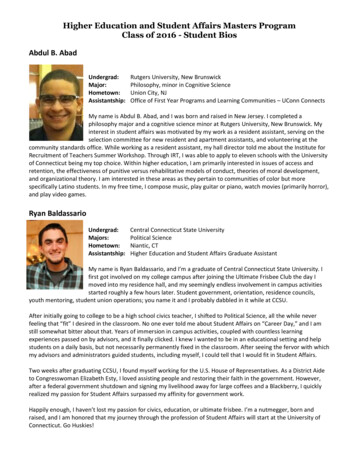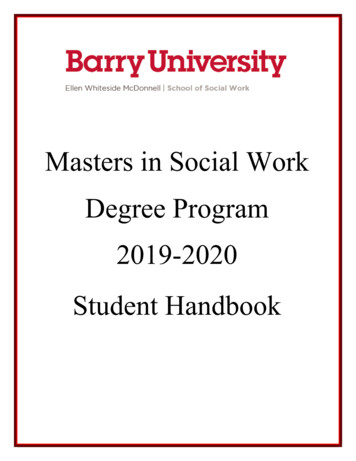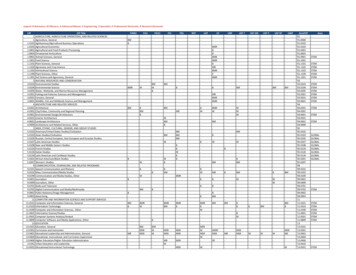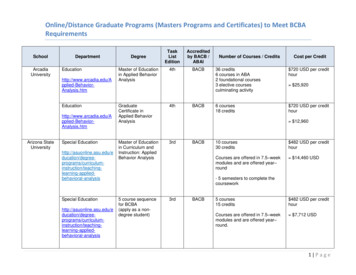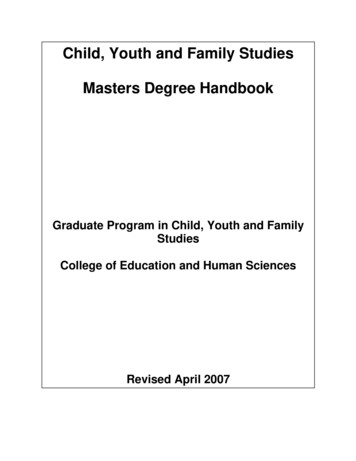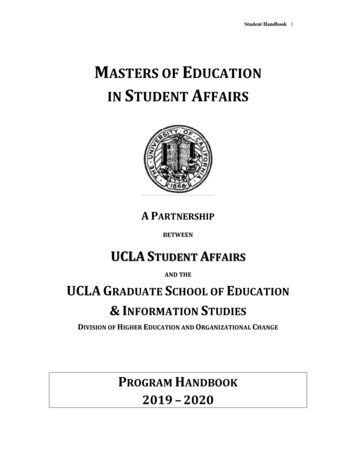
Transcription
Student Handbook 1MASTERS OF EDUCATIONIN STUDENT AFFAIRSA PARTNERSHIPBETWEENUCLA STUDENT AFFAIRSAND THEUCLA GRADUATE SCHOOL OF EDUCATION& INFORMATION STUDIESDIVISION OF HIGHER EDUCATION AND ORGANIZATIONAL CHANGEPROGRAM HANDBOOK2019 – 2020
Student Handbook2TABLE OF CONTENTSIntroduction4Welcome Letter5Division of Higher Education & Organizational Change Mission Statement6Prospective Student InformationApplication & AdmissionsSummer TermTuition & FeesFinancial AidGraduate Student ResourcesApplication & Admissions Calendar779991011Contacting the MSA Program12M.Ed. in Student Affairs Learning Outcomes13CurriculumDegree RequirementsPlanning a Program of StudyCourse DescriptionsSample Curriculum1616161722Internship & Seminar OverviewInternship FundingInternship SeminarProgram Director RoleSite Supervisor RoleSelecting Internship SitesPotential Internship Sites23242525252626Advising27Comprehensive Exam27Commencement28Job Placement28Last Updated: 8/1/2019
Student HandbookGraduate Student ResourcesGSE&IS ResourcesUCLA Graduate Student Resources303030FacultyHEOC FacultyEmeritus HEOC FacultyStudent Affairs Instructors31313233University Policies and Procedures34Appendix A:M.Ed. in Student Affairs Preliminary Academic Program PlanList of Pre-approved Diversity Courses3636373Appendix B:39Web links to Higher Education & Student Affair Professional AssociationsWeb links for Key Student Affairs Documents40Additional Student Affairs Web Links40Last Updated: 8/1/2019
Student Handbook4INTRODUCTIONThe UCLA Graduate School of Education & Information Studies (GSE&IS) and theUCLA Division of Student Affairs collaboratively offer the Masters of Education inStudent Affairs. Housed within the Higher Education and Organizational Change(HEOC) division of GSE&IS, the M.Ed. is an intensive four-quarter program of studythat concentrates on theory, practice, and research in Student Affairs inpostsecondary education. Students attend classes as a cohort on a full-time basiswithin a supportive and rigorous environment and participate in three quarters ofdirected internship. Classes are taught by HEOC faculty and Student Affairsprofessionals, many of whom are renowned scholars and national leaders in thefield. Through guest presentations and experiential work, students meet with andlearn from outstanding Student Affairs professionals from UCLA and neighboringinstitutions. Students graduate from this scholar-practitioner program and enter avariety of levels and settings in higher education as prepared, experiencedpractitioners familiar with research, ethics, and trends in the field.Last Updated: 8/1/2019
Student Handbook5WELCOME LETTERDear Student:Thank you for joining us at the UCLA Master’s Degree of Education in Student Affairs(MSA)! This program is designed to prepare professionals for employment oradvancement as creative leaders who foster student learning and developmentthrough the effective delivery of student affairs services and programs in highereducation. Our unique program is a partnership between the Graduate School ofEducation & Information Studies (GSE&IS) and UCLA’s Division of Student Affairsand is housed within the GSE&IS Division of Higher Education and OrganizationalChange (HEOC). With this powerful partnership between the UCLA Student AffairsDivision and GSE&IS, students in the MSA program have the opportunity to interactwith and learn from some of the leading practitioners and researchers in highereducation and student affairs.UCLA offers a unique opportunity for MSA students to experience the challenges andopportunities of a world-class research university while meeting the importantneed of preparing student affairs professionals for positions in public and privatecolleges and universities as well as community colleges. Students enrolled in theMSA program explore prevailing research and theories impacting the field. Thisexceptional mix of research and practice is the cornerstone of a top, world-classstudent affairs program, and we are excited that you are interested in learning moreabout the unique educational opportunities awaiting you in the UCLA Masters ofEducation in Student Affairs degree program.We’re excited that you’ve chosen the UCLA M.Ed. in Student Affairs!Sincerely,Christine Wilson, Ph.D.MSA Co-Program DirectorRobert Naples, Ed.D.MSA Co-Program DirectorJessica Harris, Assistant ProfessorMSA FacultyLinda Sax, ProfessorMSA Faculty DirectorRick WanInternship and Career DevelopmentCoordinatorLast Updated: 8/1/2019
Student Handbook6HIGHER EDUCATION & ORGANIZATIONAL CHANGEMISSION STATEMENTStudents and faculty affiliated with the M.Ed. in Student Affairs program arecommitted to enacting the principles articulated in the HEOC mission statement:The HEOC Division of the GSE&IS Department of Education represents the School'scommitment to excellence, equity, and social justice within higher education and to asteadfast belief in the transformatory nature of higher education as an institution ofsocial change. To this end, the purview of the HEOC Division encompasses: research and scholarship aimed at furthering a critical understanding of highereducation and its role in society;developing in practitioners of higher education the skills necessary forvisionary leadership, community building, and responsible citizenship;providing service to our local, state, and national communities aimed at theimprovement of higher education, and in general, the furthering of educationfor all people.We acknowledge a pluralism of values, an interdependence of communities, and adiversity of thought in all aspects of our Division in our quest for continuousimprovement and understanding of society through education.The intentional design and facilitation of Student Affairs M.Ed. curricular andexperiential learning opportunities in accordance with the HEOC Mission Statementcontributes to the cultivation of student affairs professionals who are committed toand capable of advancing a social justice mission within student affairsorganizations and higher education institutions.Last Updated: 8/1/2019
Student Handbook7PROSPECTIVE STUDENT INFORMATIONApplication & AdmissionsApplications to the M.Ed. in Student Affairs program are accepted once a year. Thedeadline to apply to the M.Ed. in Student Affairs Fall 2019 cohort is December 1,2019. Please note you may only apply to ONE graduate program per year at UCLA.All students must submit the following application materials:o a resumé;o a personal statement;o 1 original transcript from all universities attended;o 3 letters of recommendation; ando official Graduate Record Examination (GRE) score reportHow to Apply1) Log on to the Graduate Division home page t Online Application Form and follow the steps in order.2) Upload all documents, including copies of transcripts. A writing sample is notrequired. Provide three email addresses for your letters of recommendation.Be sure to submit your application, which includes payment. Yourapplication cannot be reviewed until payment is made.3) Transcripts must be postmarked by the stated deadline, and sent to:UCLA/GSE&IS1009 Moore HallBox 951521Los Angeles, CA 90095Last Updated: 8/1/2019
Student Handbook84) The GRE must be taken before November 1, 2019 in order for yourapplication to be considered. For online GRE practice tests at no charge, youcan log on to: http://www.testprepreview.com/gre practice.htmTest reports are mailed approximately 10-15 days after taking the GRE.For additional information regarding the GRE, visit www.gre.org.5) INTERNATIONAL APPLICANTS: International applicants whose firstlanguage is not English must certify their proficiency in English. Suchapplicants must submit scores received on the Test of English as a ForeignLanguage (TOEFL) as part of their application. International applicants whohold a bachelor's or higher degree from a university located in the UnitedStates or in another country in which English is the spoken language and themedium of instruction, or who have completed at least two years of full-timestudy at such an institution, are exempted from the TOEFL exam. In this case,the GRE is required in lieu of the TOEFL exam. A TOEFL score of at least 560on the paper and pencil test or 220 on the computer-based exam is theminimum required for applicants to graduate programs at UCLA. For theinternet-based TOEFL (TOEFL iBT), the following are minimum passingscores for each section and the minimum total passing score:oooooWriting: 25Speaking: 24Reading: 21Listening: 17Total minimum passing score: 87For further information about the M.Ed. in Student Affairs application process(including a list of frequently asked questions), please visit the GSE&ISwebsite (http://www.gseis.ucla.edu),call Kim Mattheussens at (310) 825-0830 or email atmattheussens@gseis.ucla.eduLast Updated: 8/1/2019
Student Handbook9Summer TermThe M.Ed. in Student Affairs degree is a one-year, four-quarter program that beginswith full-time enrollment (6 - 10 units) in the UCLA summer session. Students willreceive specific information about the process of enrolling in summer courses andapplying for summer session financial aid once admitted to the program.Please note: If you wish to be considered for student aid during the summer session youmust complete the Free Application for Federal Student Aid (FAFSA). The prioritydeadline to receive maximum awarding consideration is early March. You cancomplete the FAFSA application on the Web at http://www.fafsa.ed.gov. In addition tothe FAFSA, students must also complete the UCLA Summer Financial Aid Application athttp://www.financialaid.ucla.edu/ (these typically come available in April).Tuition & FeesFor an estimated breakdown of UCLA graduate student in-state fees and nonresident tuition for the regular academic year (i.e., fall – spring quarter enrollment),please visit the UCLA Graduate Division website at www.gdnet.ucla.edu and followthe links to “Prospective Students,” then “Student Fees and Tuition.” Information onsummer session tuition and fees can be found at the UCLA Summer Sessions website(http://www.summer.ucla.edu/). For comprehensive fee information, questionsand answers on student fees, and archived fee charts, visit the Registrar's Office FeeInformation page at iew.Financial AidThe UCLA Graduation Division (www.gdnet.ucla.edu) has developed an excellentoverview of graduate student financial aid resources. If you are an applicant ornew student, follow the links to "Prospective Students," then "Financial Supportfor Entering Students." In addition, you are also encouraged to review importantsummer-term financial aid information guidelines developed by the UCLAFinancial Aid Office (http://www.financialaid.ucla.edu/).Last Updated: 8/1/2019
Student Handbook 10Students in the M.Ed. in Student Affairs program are required to complete a threequarter 12 hours/week internship in an approved Student Affairs administrativeoffice at UCLA or a neighboring college. These internships are paid positions andstudents will receive an hourly wage. Please note that the internships do notprovide tuition waivers or fee remissions. More information on the M.Ed. inStudent Affairs internship requirement can be found in the “Internship” section ofthis handbook.If you have any questions or concerns about federal financial aid, please contact theUCLA Financial Aid Office (310-206-0400) or visit their website athttp://www.financialaid.ucla.edu/.Graduate Student ResourcesPlease review the Graduate Student Orientation Guide developed by the UCLAGraduate Division (http://www.gdnet.ucla.edu/orientation.html) for information onkey graduate student services and resources available to new and continuing UCLAgraduate students. Topics addressed in this guide include (but are not limited to):On-campus and off-campus housing options, parking and transportation, libraryinformation, student health and counseling services, and cultural and recreationalresources. In addition, you are also encouraged to visit the UCLA Graduate StudentResource Center website (http://gsrc.ucla.edu/) as well as the Graduate StudentAssociation website (http://gsa.asucla.ucla.edu) for information on campusresources and involvement opportunities.Last Updated: 8/1/2019
Student Handbook 11APPLICATION & ADMISSIONS CALENDAR2019-2020Online application availableMid-September 2019LAST date to take GRENovember 1, 2019Application deadlineDecember 1, 2019Free Application for Federal student Aid (FAFSA)Priority Filing Deadline*March 2020Applicants notified of admissions decisionsMarch-April 2020UCLA Summer Financial Aid Application AvailableApril 2020UCLA Summer Financial Aid Application Deadline**April 2020Deadline to Submit Admission DecisionResponse CardApril 15, 2020Classes BeginSummer 2020* Please consult the FAFSA website (http://www.fafsa.ed.gov) for the specificpriority filing deadline date.** Please consult the UCLA Financial Aid Office website(http://www.financialaid.ucla.edu/) for the specific application deadline date.Last Updated: 8/1/2019
Student Handbook 12CONTACTING USPlease don’t hesitate to contact one of the following individuals to request moreinformation on the M.Ed. in Student Affairs degree program:M.Ed. in Student Affairs Program Directors:Dr. Robert Naplesrnaples@saonet.ucla.eduDr. Christine Wilsoncwilson@saonet.ucla.eduM.Ed. in Student Affairs Faculty Director & HEOC Faculty Member:Dr. Linda Saxlsax@ucla.eduM.Ed. in Student Affairs & HEOC Faculty MemberDr. Jessica Harrisjharris@gseis.ucla.eduInternship and Career Development Coordinator:Rick Wanrwan@saonet.ucla.eduGSE&IS Office of Student Services:Kim MattheussensStudent Affairs Officermattheussens@gseis.ucla.edu(310) 825 – 0830Website: /student-affairs/Mailing address:UCLAGSE&IS Office of Student Services1009 Moore HallBox 951521Los Angeles, CA 90095Last Updated: 8/1/2019
Student Handbook 13M.ED. IN STUDENT AFFAIRSLEARNING OUTCOMESUpon completion of the M.Ed. in Student Affairs, students are expected to havedeveloped and be able to demonstrate the professional knowledge and competenciesdescribed below. The selection of these specific learning outcomes was informed bya review of the Council for the Advancement of Standards in Higher Education’s (CAS)(2003) “Standards and Guidelines for Masters-Level Graduate Programs for StudentAffairs Professionals.” These outcomes inform the development of relevant curricularand internship learning opportunities as well as provide students, faculty, andsupervisors with a valuable self-evaluation, feedback, and professional developmenttool.1. Social Justice Education & Transformative Student Affairs PracticeGraduates will be able to:A.B.C.D.E.Advance the full and equal participation of all groups in the universitycommunity and society, where individuals are safe, self-determiningand interdependent.Design democratic and empowering educational programs andlearning environments that foster understanding and respect fordiversity and cultivate the active engagement of others (students,faculty, colleagues) in social change.Design, conduct, and/or interpret institutional assessment activitiesthat examine all forms of discrimination and use these researchfindings to inform professional practice.Demonstrate a critical understanding of higher education and thestudent affairs profession and their role in promoting social justice.Embrace individual and organizational conflict as opportunities totransform the academic community through the identification andresolution of pressing institutional and social problems.2. Foundations of Higher Education and Student AffairsGraduates will be able to:A.Reference historical and current documents that frame thephilosophical foundations of the profession and communicate theirrelevance to current student affairs practice.Last Updated: 8/1/2019
Student Handbook 14B.C.D.E.Articulate the inherent values of the student affairs profession asstipulated in key professional documents in a manner that indicateshow these values guide practice.Demonstrate an understanding of the role of student affairs and itsfunctions within higher education.Demonstrate knowledge about and the ability to apply a code of ethicsor ethical principles sanctioned by student affairs professionalorganizations such as the American College Personnel Association(ACPA) and the National Association of Student PersonnelAdministrators (NASPA).Articulate the role and value of multiculturalism in the student affairsprofession and apply multicultural theories in professional practice.3. Student Development TheoryGraduates will be able to:A.B.C.D.Demonstrate an understanding of and the ability to apply theories ofintellectual, moral, identity, psychosocial, career, and spiritualdevelopment within the context of a multicultural campus and/orsociety; the intersection of multiple identities; and learning stylesthroughout the late adolescent and adult lifespan.Demonstrate the ability to assess the learning and developmentalneeds of students across all college-going age groups.Demonstrate the ability to create learning and developmentalopportunities informed by relevant theories.Demonstrate knowledge of the differential strengths and applicationsof student theories relative to student age, gender, ethnicity, race,culture, sexual identity, disability, spirituality, national origin,socioeconomic status, and resident/commuter status.4. Student Characteristics & Effects of College on StudentsGraduates will be able to:A.B.C.Demonstrate knowledge of how student learning and learningopportunities are influenced by student characteristics and bycollegiate environments.Apply knowledge of student characteristics in the design andevaluation of student learning experiences.Understand the complexity and diversity of curricula and cocurricular learning environments.5. Individual & Group InterventionsGraduates will be able to:A.Design and evaluate effective educational interventions forindividuals and groups.Last Updated: 8/1/2019
Student Handbook 15B.C.D.E.Demonstrate knowledge and skills in interpersonal and groupcommunication that reflect a commitment to multiculturalism and theability to communicate with diverse audiences.Demonstrate the interpersonal skills essential for addressingindividually, as well as collaboratively, crisis and conflict resolutionsituations.Recognize student leadership and group development issues andeffectively utilize methods of intergroup relations to promote studentlearning and success.Demonstrate an understanding of the current issues affectingstudents’ ability to achieve and provide both advocacy andintervention skills as necessary for the situation.6. Organization & Administration of Student AffairsGraduates will be able to:A.B.C.D.Identify and apply leadership, organizational, and managementpractices that assist institutions in accomplishing their mission.Demonstrate the knowledge and skills essential for working andleading in a multicultural environment.Actively participate in the processes of planning, budgeting and fiscalmanagement, assessing outcomes, and coordinating campus andcommunity relations.Create opportunities for collaboration of appropriate departments,understand and mitigate as needed the interactions of student affairsstaff, and model the qualities of a student affairs leader.7. Assessment, Evaluation, & ResearchGraduates will be able to:A.B.C.D.E.Demonstrate knowledge of basic quantitative and qualitative methodsused in the study of student learning and development.Demonstrate knowledge of student learning and outcome assessmentmodels, environmental and organizational assessment techniques;and program evaluation.Read and critique research that informs the field of student affairs.Demonstrate ability to use assessment, evaluation, and research datato inform practice and
With this powerful partnership between the UCLA Student Affairs Division and GSE&IS, students in the MSA program have the opportunity to interact with and learn from some of the leading practitioners and researchers in higher education and student affairs. UCLA offers a unique opportunity for MSA students to experience the challenges and
